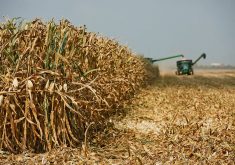NEW DELHI, India (Reuters) — Indian authorities rushed approvals for a locally developed genetically modified mustard variety by violating environmental regulations, a group of activists opposed to GM crops said Jan. 6.
In October, India granted environmental clearance for indigenously developed GM mustard seeds, paving the way for the commercial use of its first GM food crop.
During its evaluation and approval for GM mustard, the Genetic Engineering Appraisal Committee, a regulator under the Ministry of Environment, Forest and Climate Change, violated bio safety regulations, said the Coalition of GM-free India.
Read Also

Trump’s tariffs take their toll on U.S. producers
U.S. farmers say Trump’s tariffs have been devastating for growers in that country.
GEAC’s decision was riddled with serious regulatory lapses, the coalition said in a report.
The government responded on Jan. 7, saying in a statement the GEAC cleared GM mustard after lengthy trials and scrutiny of relevant data gathered over the years. The regulator has followed every guideline for approving the GM mustard crop, it said.
The authorities considered environmental release only “after the applicant completed three years of Biosafety Research Level (BRL) I and II trials conducted under confined field conditions,” and after an environmental risk assessment, the government said.
New Delhi approved GM mustard, part of the rapeseed family, to help cut the country’s expensive cooking oil imports.
Mustard has the highest oil content among India’s nine main oilseeds, including soybeans and peanuts, but crop yields have stagnated for years.
India, the world’s biggest edible oil importer, meets more than 70 percent of its cooking oil demand through imports.
In the fiscal year to March 31, New Delhi spent a record $18.99 billion to import vegetable oils, prompting Prime Minister Narendra Modi to voice concerns about India’s rising vegetable oil import bill.
India’s top agricultural scientists have said the GEAC has approved GM mustard seeds after a lengthy trial and the new variety is safe for the environment and human health.
Since allowing GM cotton in 2002, India has not approved any transgenic crop.















